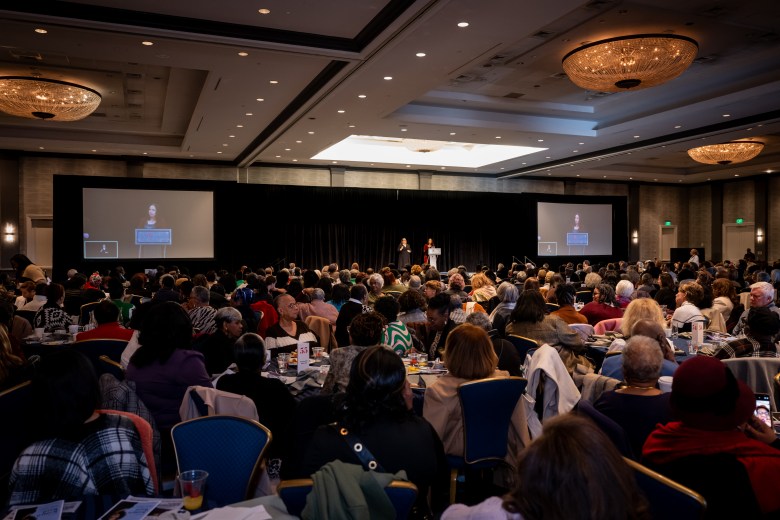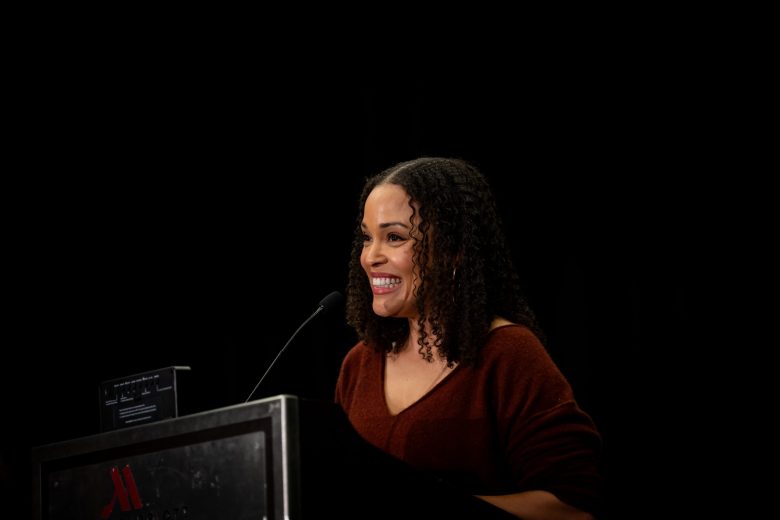“By the time I came along in 1977, my grandmother had worked as a housekeeper, a health aid in an elder care facility, a hairdresser, a seamstress, and finally as a worker in a pharmaceutical bottling plant,” author Jesmyn Ward told the crowd gathered at the Baltimore Marriott Waterfront hotel for Enoch Pratt’s annual Booklovers’ Breakfast. “But my grandmother Dorothy was more than her labor. My Dorothy was a storyteller.”
Since 1988, the library has utilized the Booklovers’ Breakfast to celebrate the start of Black History Month. This year, it was held on February 3. In its function and execution, the annual event showcases many truths about access, literacy, and the role of booklovers in communities.
Ward herself is a storyteller. She was the first woman and first Black American to win National Book Awards for her novel “Sing, Unburied, Sing” (published in 2017) and “Salvage the Bones” (published in 2011). Additionally, readers can explore her work in nonfiction with “Men We Reaped” (2013), “Navigate Your Stars” (2020), and an essay featured in “The Fire This Time: A New Generation Speaks About Race” (2016).
Each work is grounded in Ward’s mastery of language and honesty about American history. Whether she is drawing us into a world of magical realism or uncovering the agonizing grief of mourning those gone too soon, Ward cuts open the myths of American life and lets the horrors and the love bleed out.
Over the course of Ward’s speech, we get to her truth while also getting to know her and her family well. Her descriptions of her loved ones are vivid and strikingly familiar.
Over the course of Ward’s speech, we get to her truth while also getting to know her and her family well. Her descriptions of her loved ones are vivid and strikingly familiar. She tells us about her grandmother’s gold teeth and ears full of piercings and gold jewelry. In between these descriptions, she also says that at one time there were more than 14 of her family members living in her grandmother’s house at once.
Her refrain, given to her by her grandmother, is “tell it straight, tell it true.” And she does. Ward does not shy away from telling the truth about her family’s experiences of infant mortality and the harsh conditions of domestic labor on Black women working in white, wealthy homes. She offers evocative, stirring examples that “love and loss are twins in life.”
“In part, I tell it straight because grandmother no longer can,” she says. “The reason I speak of my grandmother in the past tense is not because she is dead. It is because my grandmother is losing her memory. The first storyteller of my life is losing her stories.”
Ward says that her Grandma Dorothy is losing her memory due to Alzheimer’s, and the room — full of Black elders with memories just like Dorothy’s — shares this feeling of heartbreak and anguish. We sit with her in these truths and let her know she is heard, seen, and witnessed in a magnitude fitting her vulnerability. Ward acknowledges us, and her larger audience, with the knowing admission that she “is not alone in this endeavor” of telling Southern Gothic tales.
Ward says she is committed to the hard task of “telling this American story.” She is candid that sometimes she wishes to tell “happy stories” not rife with grief, death, and dying, but she is frank that these harsh truths are her reality. These truths are how she learned Mississippi and how she continues to learn America.
“I tell this Mississippi tale. I write toward what hurts. I write toward the truth, and I tell it again. I scribe the whole,” Ward says.
“I tell this Mississippi tale. I write toward what hurts. I write toward the truth, and I tell it again. I scribe the whole,” Ward says.
Her role as a contemporary steward of the Southern Gothic literary traditions shines in the time she takes to draw us all in to her recollections of family, grief, and storytelling. She does not rush, and neither does the audience. We all surround her, taking in her words and delivering our own awe back to her as proof that we are listening.
In this truth, the audience remains a steady, listening ear. We all hang on to Ward’s lush storytelling and respond with our own gasps, laughter, and moans. We react because Ward’s story requires it. There is no use in meeting her candor with silence.
Witnessing Ward’s speech helps to solidify my belief that she is one of the strongest contemporary storytellers in the Southern Gothic tradition. Her work in fiction epitomizes the Southern Gothic genre as she frequently explores the haunting impact of racial violence, patriarchy, and classism on communities. She joins literary giants like Toni Morrison, Jean Toomer, and Gloria Naylor in illuminating the shadowy horrors that ravage the lives of Black characters set in the American South. Ward, and her fellow Mississippian, Kiese Laymon, continue this tradition well and introduce new audiences to the glory of Southern Gothics.
Ward’s storytelling brings together intergenerational audiences with a common goal. The elders in the room, myself, and those attendees younger than me each arrived at the venue in search of rich storytelling from a contemporary writer not shy about writing for Black readers. The event serves as a place of communion for readers; a gathering around Ward’s literary campfire.

The Booklovers’ Breakfast focuses on the keynote speaker while also bringing together readers from all over the state. As I ate, I got to know the Trinidinian elder sitting next to me and learned about her journey to the event that morning. Miss Joanne ventured to the breakfast from her home in Tacoma Park. The journey was not an easy feat, but Miss Joanne, an avid reader and big fan of Ward’s work, was determined nonetheless. She, and her fierce determination, took the bus to downtown Baltimore and got off when the Inner Harbor was in sight.
From there, with the support of her walker, she began walking in search of the Charm City Circulator, buses that offer free trips throughout downtown Baltimore.
“I looked up that it’d take two Circulators to get me here,” Miss Joanne says between bites of her smoked salmon croissant. Moments passed, and with no Circulator in sight, she stepped out on faith and asked a passing car for directions to the Marriott. The driver, a young lady of Trinidinian descent herself, offered Miss Joanne a ride and her number to stay in touch when the event ended. With the kindness of a stranger, Miss Joanne arrived at the event with a few minutes to spare before the program started.
My conversation with Miss Joanne added to an ongoing symphony of conversations and the reverb of hundreds of pieces of silverware hitting ceramic plates. The room was brimming with the joyous noise of people gathering. From the minute the doors opened, there was never a quiet moment on the fourth floor.
My conversation with Miss Joanne added to an ongoing symphony of conversations and the reverb of hundreds of pieces of silverware hitting ceramic plates. From the moment the doors opened, the fourth-floor room brimmed with the joyous noise of people gathering.
The 36th annual Booklovers’ Breakfast is a shining example that Baltimore is full of avid readers with needs for connection. The event takes more than six months of planning and continues because of the belief that Baltimoreans deserve access to media, literature, and events that spark their interests. With over 70 tables full of excited guests, the annual Booklovers’ Breakfast is a reminder that cities need booklovers, and booklovers need reliable public transit and funded public libraries.

